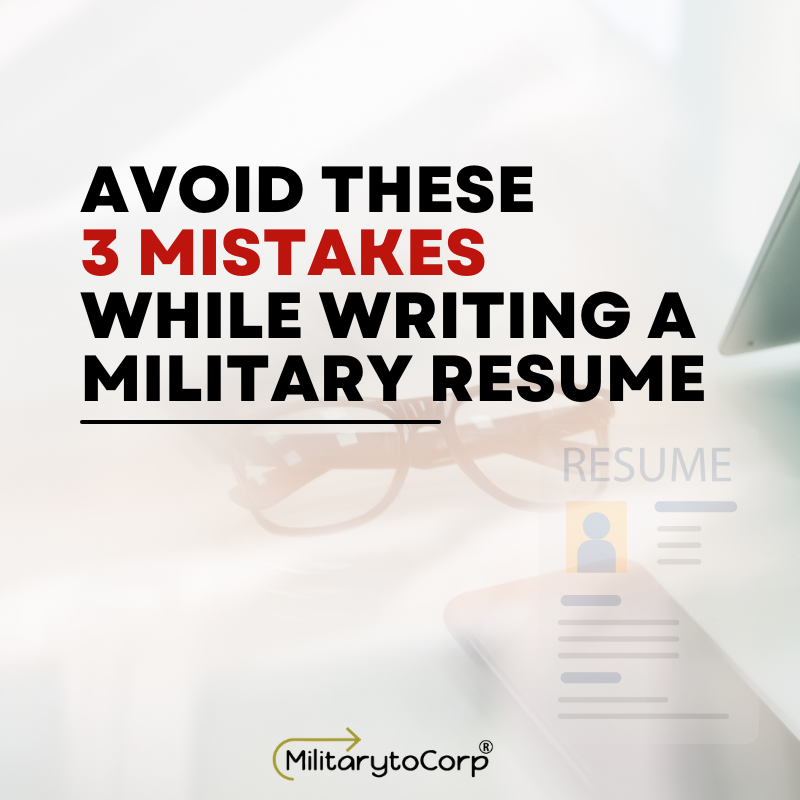
Recently, M2C published several job opportunities on its website for ex-military talent across domains such as business development, legal and admin, operations, and marketing for which hundreds of resumes were received; resumes ranging from two pages to 12 pages, from stereotyped to professionally written, from general to job-specific, and from military-jargon-laden to corporate-heavy-terms. The very basic idea of writing a resume is to effectively leverage your skills, resulting in an interview call. However, there were certain grey areas observed in most of the military resumes that barred the candidates from being on resume shortlists despite having the required soft skills and work-content skills. Let’s have a look at some of these most common resume mistakes:
Military Jargon- But Recruiters Are Civilian
You were ADC to GOC-in-C or a Col GS, Wow, sounds great! How does that sound to your civilian friends? Too much military jargon confuses the HR recruiters to the extent that they don’t understand what skills you have and what responsibilities you discharged in the military and thus are not able to correlate where you would best fit with their company. It’s important to describe the skills gained during your active duty in a transferable manner relating to the job description (JD), reflecting them to incorporate relevant skills. This would be possible if you translate the military training, professional experience, and technical courses into civilian terminology in a result-oriented-business manner. Many times, HR managers at our client companies have fallen back to us to understand some of these military acronyms or to request a fresh resume without the military jargon.
Though you would have never felt the need to create a resume in your military career, incorporating, your resume is essentially your first contact with the HR Managers. The translation of your military experience into corporate terminology is one of the most challenging tasks you’ll face, however, it is also the most essential task. In our resume building services, we lay due to stress on harmonizing the military and corporate vocabulary to create job compelling resumes.
One Size Fits All – No, Recruiters Need Specifics
A recently retired Major from Infantry registered on our portal and applied for a mid-level operations position for a leading E-Commerce firm. His resume was of a Super Hero, a 10-page long with shades of every domain including HR, security, Admin, operations, finances, and many more. During our initial interaction with him, he hesitantly accepted that though he has been sharing this resume for any and every position, he hasn’t heard much from the HR community in terms of the resume shortlist. When further asked how he created this resume, he admitted that he did cut, copy, and paste from the sample CVs shared by one of his unit seniors who retired earlier. He had no clue that for a mid-level operations role, mentioning that he was the champion of divisional level shooting competition may have no or very little impact. He didn’t even go through the JD for the operations role which we shared with him. Ideally, he should have aligned his profiles with the JD and highlighted the relevant leadership and people management experience he would have done as a Quartermaster (Manager-Logistics) besides his other relevant Operations experience in a two-page job-relevant compelling resume instead of 10 pages long irrelevant generic resume.
In India’s competitive environment, recruiters at good companies get hundreds of resumes for any job opening. They have limited time to go through each resume and when they read vague objectives such as “A sincere and hardworking professional seeking an opportunity that will utilize my skills” or when they read skills that aren’t related to that specific domain, probably they don’t even think twice to discard such resumes. This one-size-fits-all approach doesn’t go well in job search and therefore it is non-negotiable to align and orient one’s profile each time one applies for a job opening. Any such alignment or tweaking must be factual-based and augmented with relevant experiences in a presentable manner. This also calls for discretion by not applying for jobs that one doesn’t qualify for.
A Long Resume-But Recruiters Have No Time
As was the case with the Major, we did receive many resumes that spanned almost 10 plus pages. There is no denying the fact that military professionals, by their numerous postings in different roles and challenging circumstances, gain enormous real-life experiences in leadership, problem-solving, team building, and crisis management and therefore there is always a temptation and bias to share every bit of this vast experience, thinking that it may add value to the resume and impress the recruiter. In today’s fast-paced environment, while we all are looking at ways to do maximum work in the minimum time frame, at the same time we are compelling the recruiter to read our research-paper size resume and expecting even positive results. Are we correct in that? Repeating the same experience again and again for every role would lead to a boring long resume, found wanting in creativity. We know that in the military, your medals were your resume which was worn by you proudly on your chest and thus you don’t have any experience in writing resumes. Thus, during the retirement phase, you may seek professional help or even help from your ex-military/civilian friends especially those who are working in similar positions that you are seeking.
Military professionals have rare real-life experiences and exceptional skills that have enormous business potential, however, it is observed that much is lost in translation (during transition).
At M2C, we advise every military job seeker, especially those who are about to retire or recently retire to genuinely invest time and effort in creating strong and job compelling resumes and aligning them with the JD every time they apply for a new role.
Happy Career!
Team M2C
Add a comment
* Login Required